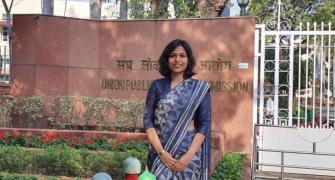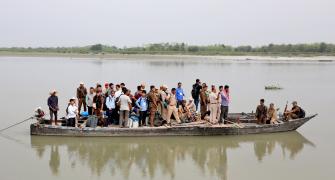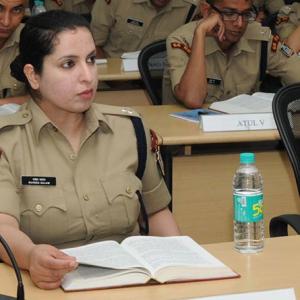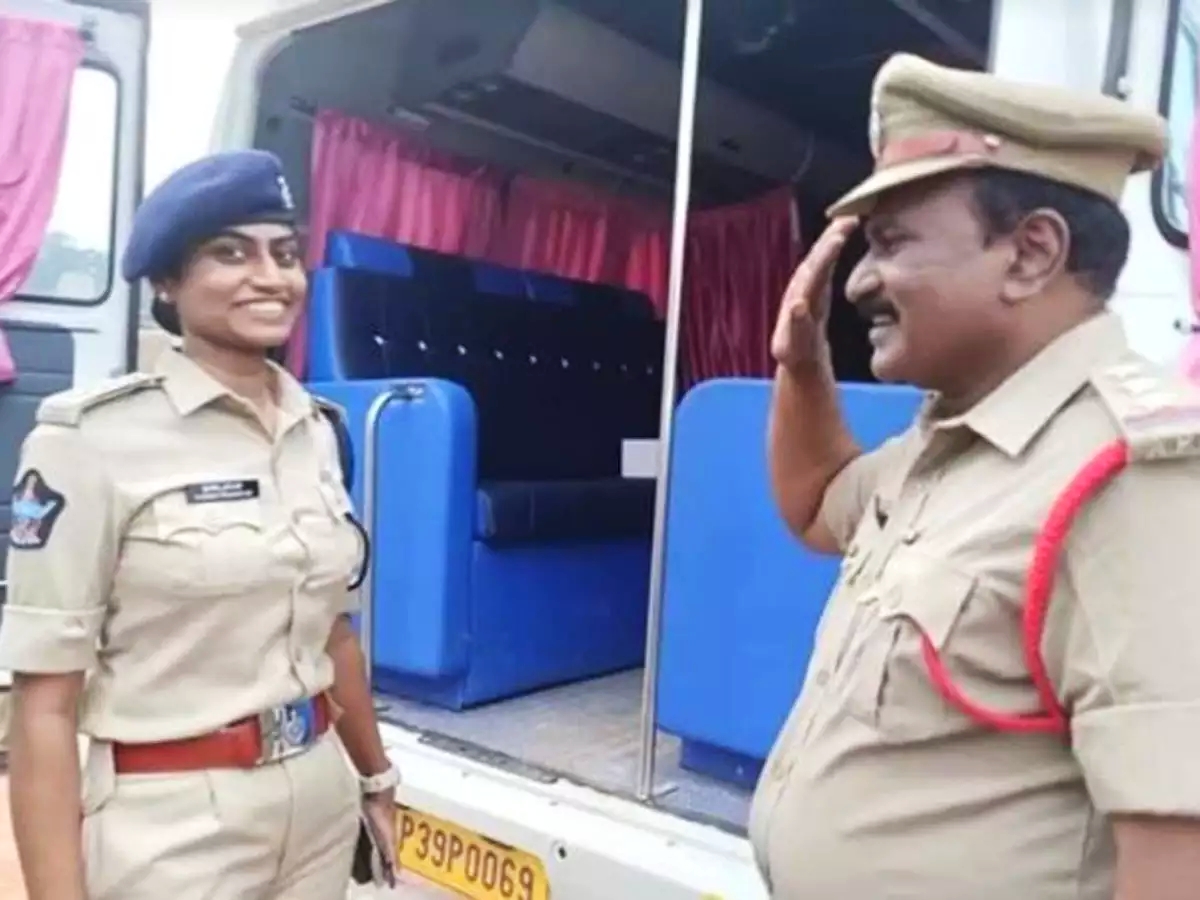'Any person who wants to enter this service should have a single object of serving the public irrespective of hindrances.'

As a computer engineer, he could have had a good job at IBM and a career that minted money.
Instead, P Aravindhan, 35, chose to give the civil services exam and join the Indian Police Service, a decision he has never regretted.
Over the years, Aravindhan has held significant posts in Tamil Nadu. He is currently the Chennai zonal director for the Narcotics Control Bureau, with jurisdiction over Tamil Nadu, Kerala, Pondicherry and Lakshadweep.
When you are in the police force, Aravindhan tells Rediff.com's A Ganesh Nadar, you have to remember that "you are there to serve the people".
You graduated in computer engineering from BITS-Pilani, and then worked at IBM in Bengaluru. After a dream career start like this, what made you join the IPS?
Since my third year in college, I wanted to join the IPS.
I got a job with IBM through campus placement so I joined them as I wanted exposure in the software field. I worked there as a software engineer for a year.
After that, I went to Delhi for UPSC coaching, appeared for the exams and applied for the IPS.
During the interview round in your IPS selection process, you were asked how your computer science degree would help you perform better as a police officer. Did you make a conscious effort to use your degree in your work? Could you give us some examples of how it helped?
I joined the Tamil Nadu police force as an assistant superintendent. Since then, I have been using technology in police work to increase efficiency.
When I was deputy commissioner of police, traffic, at T Nagar in Chennai, I used face recognition software.
Now, this software is available all over Tamil Nadu. Every sub-inspector has it on his smart phone.
This scheme was launched by Tamil Nadu Chief Minister Stalin.
You scored an All India rank of 164 in the civil service exam. This would have allowed you to opt for the IAS. Why did you choose the IPS?
When you are part of the IPS, you get an opportunity to interact with the public and solve their grievances.
Vijay Kumar, the IPS officer (who led the operation against sandalwood smuggler Veerappan), inspired me.
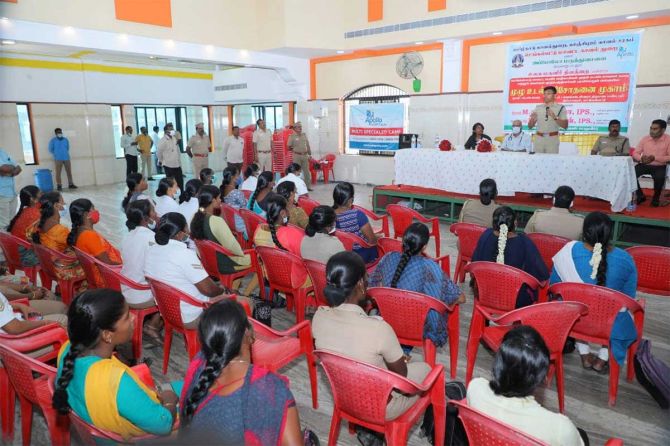
You have handled various responsibilities in your career in the police force. Could you share one lesson you have learnt from each of these postings and how it has helped you grow professionally?
The most important learning is that the trust the people have in the bureaucracy has to be respected and we should work accordingly.
Our underlying moto should be 'to serve the public'. We must keep that in mind whatever position we are in.
Have you faced political pressure over any of your decisions? How did you deal with it?
Political pressure has been both positive and negative. They have helped us catch drug peddlers.
When the pressure is negative, I have politely turned down their request.
Later, they saw the merit of my action and applauded it.
Which of your achievements are you most proud of and why?
When I was superintendent of police in charge of Virudhunagar district, a Class 12 topper was kidnapped three days after the results were declared.
We found her within 48 hours and united her with her parents; the accused did not get a chance to harm her.
Earlier, in Karur district, a village had been divided into two factions because of which they had not conducted their temple festival for 15 years.
As assistant superintendent of police then, I talked to both factions and ensured the festival took place.
When I was SP of Thiruvallur district, we identified school dropouts from Class 9 to Class 12 through an NGO and brought them back to school. Otherwise, beginning with petty acts, they could have become part of the criminal world.

Has your work profile changed since the pandemic?
Actually, the nature of work changed drastically.
We had to enforce the lockdown. At the same time, we had to ensure that people got the essentials they needed.
We had to control crime as more people were unemployed because of the pandemic.
We had to control the availability illicit liquor and spurious liquor which leads to a number of deaths.
We had multi-faceted responsibilities during the pandemic. Many police officials were working as frontline warriors and some ended up losing their lives.
The police department put up an extraordinary effort along with other frontline workers and ensured that Tamil Nadu was one of the better performing states in controlling the pandemic.
You are very active on social media. How has this helped perform your job more effectively? How much time do you spend on social media? Is it a compulsory part of the job profile for your juniors?
I spend one hour every day on social media.
Many people from different parts of the country are in touch with me. They tell me about illegal activities in their area.
If it is in my area, I take direct action and, if there is any wrongdoing by subordinates, we are able to identify them.
Most youth are there on social media. I would encourage young officers to be on social media.
Do you feel your presence in social media has helped change the way the public perceives the police force? How can social media be used more effectively by the police force?
It has definitely changed the way the public looks at the police.
They find that we are easily approachable on social media and many prefer that to walking into an office or a police station.
Most issues that require our attention become viral on social media before we get it through official leads.
You won the Sword of Honour for being the best outdoor probationer at the National Police Academy. Sports and the outdoors continue to be a part of your life. Why is this so important?
I feel that a healthy mind resides in a healthy body. Sport serves as a medium to channelise our energy in a positive way.
Wherever I go, I encourage youngsters to actively participate in sports.
It increases their confidence, inculcates team spirit and improves their communication skills.
It encourages a healthy lifestyle throughout their life.
What are your favorite sports? How often do you find time to play?
My favorite sport is badminton. I play three or four times a week.
When I don't get company for badminton, I go swimming.

Work-life balance is a popular term these days. It must be even more difficult to achieve this in your profession. How do you manage?
It is extremely difficult to maintain work-life balance in a profession like ours where we don't know what our day will be like.
I try to spend most of my free time with my family and children.
Your younger brother Abhinandan also joined the IPS. Did seeing what you have achieved inspire him?
He is part of Group One, Delhi police, not the IPS. He is in the Delhi, Andaman and Nicobar Police Service.
He was definitely inspired by me. We planned it together, but it took him time to crack the civil service examination.
Did your parents have a role to play in your career choice? Is anyone in your family part of the IPS?
Nobody in my family is in the IAS or the IPS.
My parents encouraged me to pursue my dreams.
They supported me when I took the decision to resign from my job with IBM.
They always believed in me and that I would achieve what I aspire for.
You cleared the civil service exam at your first attempt with an All India rank of 164. How did you prepare for it? Could you share some tips for young aspirants who are attempting this exam?
First and foremost, you have to strengthen your fundamental knowledge. You must read all the NCERT books for students from Class 9 to Class 12.
The subjects you must cover are history, geography, political science and economics.
Then you must read the newspapers for one hour every day which will help you keep abreast of current affairs.
What question should those aspiring to join the IPS ask themselves? Also, while IPS officers do face a lot of challenges, what are the 'hidden truths' about this job that one should be aware of?
Any person who wants to enter this service should have a single object of serving the public irrespective of hindrances.
Though the IPS is a one of the most challenging jobs in the country, it gives you the opportunity to take on a leadership role at a very young age.
Any person who wants to lead society towards change should definitely look at the IPS as a career option.
Feature Presentation: Ashish Narsale/Rediff.com

